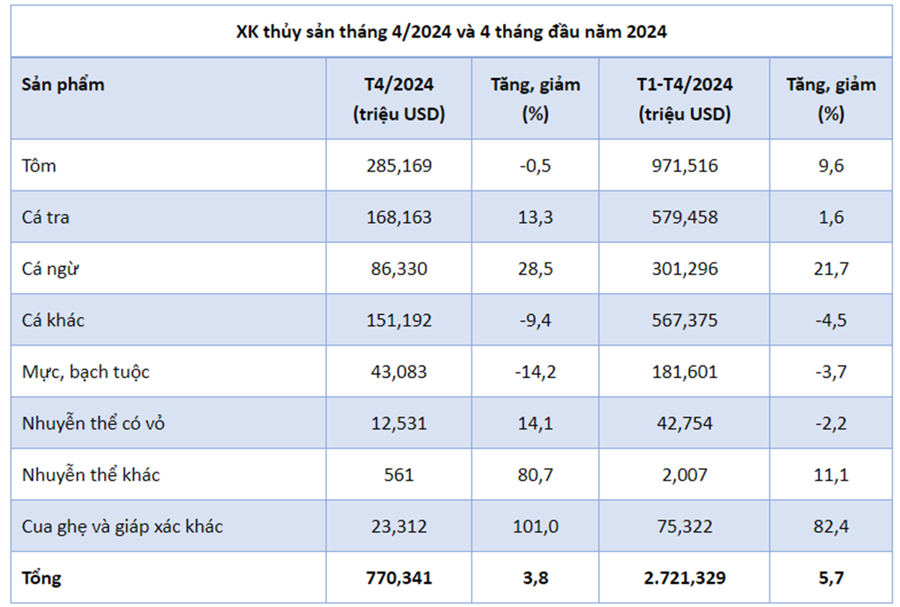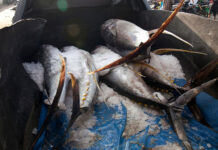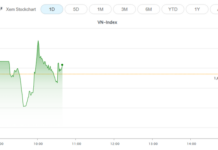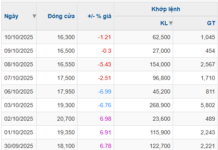According to the Vietnam Association of Seafood Exporters and Producers (VASEP), exports of tuna, pangasius, crab, and mollusks all saw positive growth. However, shrimp exports in April 2024 remained stagnant compared to April 2023, while exports of squid, octopus, and other marine fish continued to lag behind.
GREEN LIGHT FOR PANGASIUS EXPORTS
In April 2024, shrimp exports reached $285 million, showing no growth from the previous year, but still the highest this year. The cumulative revenue for the first four months of 2024 was $971 million, a 6% increase compared to the same period in 2023.
Businesses have noted that consumer demand has not yet shown a clear recovery for shrimp products. Export prices to various markets remain low compared to 2022 and 2023.
“The Vietnamese shrimp industry is in a state of uncertainty due to anti-dumping tax-related issues. The US is currently considering recognizing Vietnam as a market economy, and a positive outcome is hoped to remove trade barriers and relieve the burden on Vietnamese shrimp exporters,” shared Ms. Le Hang, VASEP’s Communications Director.

VASEP reported that pangasius exports in April 2024 increased by 13% compared to April 2023, reaching $168 million, a positive sign after consecutive declines in February and March 2024. Exports to the US market improved, especially after pangasius enterprises participated in the North American Seafood Expo in March 2024, followed by the Global Seafood Expo in Spain at the end of April 2024.
In addition to the main product of frozen pangasius fillets, enterprises tend to promote processed products, value-added items, which have attracted the interest of importers. Thanks to these efforts, pangasius exports in the first four months of 2024 reached $579 million, a nearly 2% increase compared to the previous year.
“Among the top 5 seafood export markets, only exports to Japan and South Korea saw slight increases in April 2024. Meanwhile, exports to the EU and the US remained stagnant or slightly decreased, and exports to China-Hong Kong decreased by over 22%.”
Ms. Le Hang, VASEP’s Communications Director.
Tuna exports in April 2024 increased by 28% compared to April 2023, reaching over $86 million. The cumulative export turnover for the first four months was $301 million, a 22% increase compared to the previous year.
Compared to other industries, tuna has shown stable and strong growth in the past four months (except for an 11% decrease in February due to the Tet holiday). However, according to tuna businesses, market imports have increased due to reduced inventory rather than improved market conditions or better export prices.
While squid and octopus exports decreased by 14% in April 2024, mollusk exports increased by 14%. In the first four months of this year, these two industries brought in $182 million and $43 million in revenue, respectively, a decrease of 4% and 2% compared to the same period in 2023.
Crab exports continued to impress in April 2024 with a 101% growth rate, with China as the main market and live crab as the dominant product. In addition to live crab, other products such as live lobster and sea cucumber from Vietnam still have great potential in China due to geographical advantages and less competition compared to frozen products.
Overall, markets are still affected by inflation and inventory issues, leading to cautious seafood imports. A typical example is the Chinese market, which has continuously declined since February after a strong increase in January for the Lunar New Year holiday. China has multiple suppliers and competitive prices, giving Chinese partners various options to purchase at lower prices.
“It is expected that inventory and oversupply issues will gradually improve and become more favorable for seafood importers in the second half of the year, and exports may recover if bottlenecks in seafood and shrimp and pangasius raw materials are resolved,” said Ms. Le Hang.
BOTTLENECKS DUE TO NEW REGULATIONS
VASEP stated that the tuna, squid, octopus, and other marine fish processing and export industries face a common challenge: a lack of raw materials, as the catch is insufficient to meet demand, requiring additional imports. However, regulations in the EU market and new regulations in Vietnam related to IUU fishing are exacerbating the raw material bottleneck.
Regarding imported seafood raw materials, Decree 37/2024, issued in April 2024, requires a 72-hour advance notice for foreign vessels and 48 hours for container vessels before arriving at the port, which is impractical.
Decree 37 stipulates: Do not mix imported seafood raw materials from capture with domestic seafood raw materials in the same lot for export. The new regulation’s unclear definition of “mixing raw materials” has caused confusion for businesses and is unreasonable considering the actual production and business practices of seafood enterprises.
On May 13, 2024, the Vietnam Association of Seafood Exporters and Producers (VASEP) sent Document No. 54/CV-VASEP to the Minister of Agriculture and Rural Development, Le Minh Hoan; Deputy Minister of Agriculture and Rural Development, Phung Duc Tien; the Department of Legal Affairs (MARD), the Directorate of Fisheries, the Directorate of Fisheries Control, and the Department of Quality Management. The document proposed addressing certain issues in Decree 37/2024/ND-CP, Decree 38/2024/ND-CP, and some current regulations.
In the document, VASEP stated that Decree No. 37/2024/ND-CP of the Government (amending and supplementing a number of articles of Decree No. 26/2019/ND-CP detailing a number of articles and measures to implement the Law on Fisheries) signed on April 4, 2024, and taking effect on May 19, 2024, is an important legal framework that the Association and the business community are particularly interested in understanding and complying with.
On April 23, 2024, VASEP organized a conference to disseminate Decree 37/2024 and Decree 38/2024/ND-CP to enterprises processing and exporting exploited seafood in Ho Chi Minh City. Some new and amended provisions were discussed and reflected to the Association’s office after the conference ended in the following three weeks.
As the effective date of the two decrees (May 19, 2024) approached, exploited seafood enterprises expressed concern and confusion. Therefore, VASEP requested that the Ministry’s leaders consider reviewing and addressing the mentioned issues to ensure the high feasibility, effectiveness, and efficiency of Decree 37/2024 and Decree 38/2024. This would help control IUU regulations, contributing significantly to lifting the yellow card and maintaining the legal production and exploitation capacity of fishermen and the competitiveness and exports of enterprises in the industry.




































